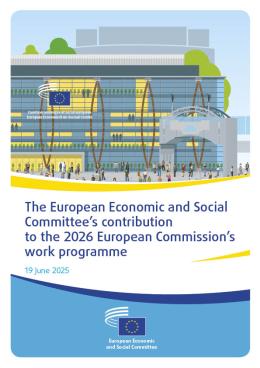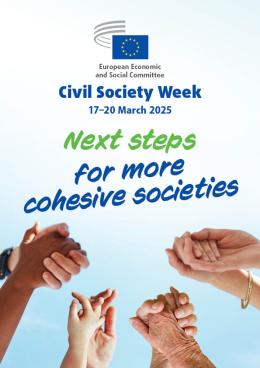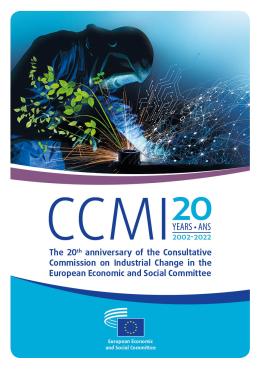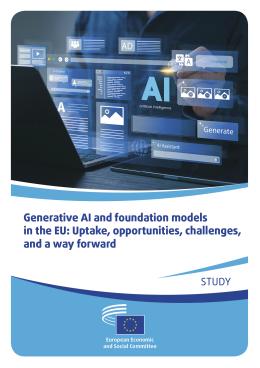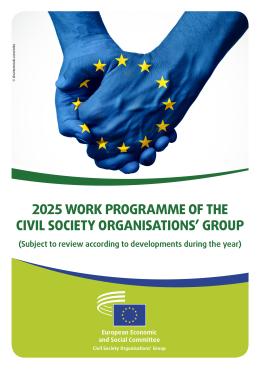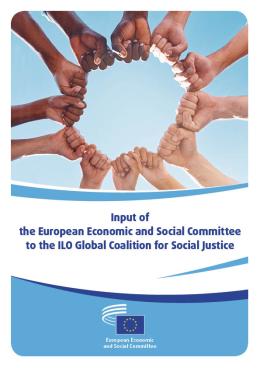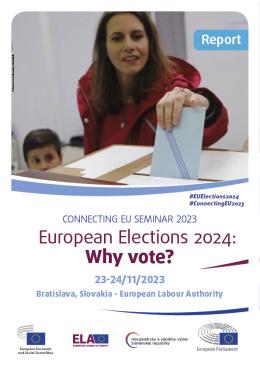European Economic
and Social Committee
Main navigation
-
Over
ABOUT
The European Economic and Social Committee (EESC) is the voice of organised civil society in Europe.
Find out more about its role and structure at http://www.eesc.europa.eu/en/about
- Politieke organisatie
- Administratieve organisatie
- SAMENWERKING MET ANDERE INSTELLINGEN
- Rules
-
Onze werkzaamheden
OUR WORK
The EESC issues between 160 and 190 opinions and information reports a year.
It also organises several annual initiatives and events with a focus on civil society and citizens’ participation such as the Civil Society Prize, the Civil Society Days, the Your Europe, Your Say youth plenary and the ECI Day.
Find the latest EESC opinions and publications at http://www.eesc.europa.eu/en/our-work/opinions-information-reports/opinions and http://www.eesc.europa.eu/en/our-work/publications-other-work/publications respectively.
- Adviezen en informatieve rapporten
- Documenten
- Publicaties en dergelijke
-
Maatschappelijk middenveld en participatie van burgers
- Civil Society Week
- European elections 2024
- Prijs voor het maatschappelijk middenveld
- The Conference on the Future of Europe
- Europees paspoort voor democratie
- Jouw Europa, jouw mening!
- Europees burgerinitiatief (EBI)
- The path to our industrial future
- Youth Climate and Sustainability Round Tables
- EU Organic Awards
- Civil Society Against COVID 19
- EESC stands with Ukraine
- Partnerships
- Relations with ESCs
-
Beleidsterreinen
POLICIES
The EESC is active in a wide range of areas, from social affairs to economy, energy and sustainability.
Learn more about our policy areas and policy highlights at http://www.eesc.europa.eu/en/policies
-
Beleidsterreinen
- Landbouw, plattelandsontwikkeling en visserij
- Klimaatactie
- Cohesie, regionaal en stedelijk beleid
- Consumenten
- Digitalisering en informatiemaatschappij
- Economische en Monetaire Unie
- Onderwijs en opleiding
- Werkgelegenheid
- Energie
- Ondernemingen
- Milieu
- Externe betrekkingen
- Financiële diensten en kapitaalmarkten
- Grondrechten en burgerrechten
- Housing
- Industrie en industriële verandering
- Institutionele aangelegenheden en EU-begroting
- Migratie en asiel
- Onderzoek en innovatie
- Diensten van algemeen belang
- Interne markt
- Sociale aangelegenheden
- Duurzame ontwikkeling
- Belastingen
- Vervoer
-
Beleidsterreinen
-
Agenda
AGENDA
The EESC holds nine plenary sessions per year. It also organises many conferences, public hearings and high-level debates related to its work.
Find out more about our upcoming events at http://www.eesc.europa.eu/en/agenda/our-events/upcoming-events
- Onze evenementen
-
Nieuws & media
NEWS & MEDIA
Here you can find news and information about the EESC'swork, including its social media accounts, the EESC Info newsletter, photo galleries and videos.
Read the latest EESC news http://www.eesc.europa.eu/en/news-media/news and press releases http://www.eesc.europa.eu/en/news-media/press-releases
- President
-
Leden & groepen
MEMBERS & GROUPS
The EESC brings together representatives from all areas of organised civil society, who give their independent advice on EU policies and legislation. The EESC's326 Members are organised into three groups: Employers, Workers and Various Interests.
Find out more about our Members and groups at http://www.eesc.europa.eu/en/members-groups
- Leden
- Groepen
-
Afdelingen & andere organen
SECTIONS & OTHER BODIES
The EESC has six sections, specialising in concrete topics of relevance to the citizens of the European Union, ranging from social to economic affairs, energy, environment, external relations or the internal market.
Find out more at http://www.eesc.europa.eu/en/sections-other-bodies
-
Afdelingen / commissies
- Economische en Monetaire Unie, Economische en Sociale Samenhang (ECO)
- Interne Markt, Productie en Consumptie (INT)
- Vervoer, Energie, Infrastructuur en Informatiemaatschappij (TEN)
- Werkgelegenheid, Sociale Zaken en Burgerschap (SOC)
- Landbouw, Plattelandsontwikkeling en Milieu (NAT)
- Externe Betrekkingen (REX)
- Adviescommissie Industriële Reconversie (CCMI)
- Waarnemingsposten
- Andere
-
Afdelingen / commissies
- Ukraine
